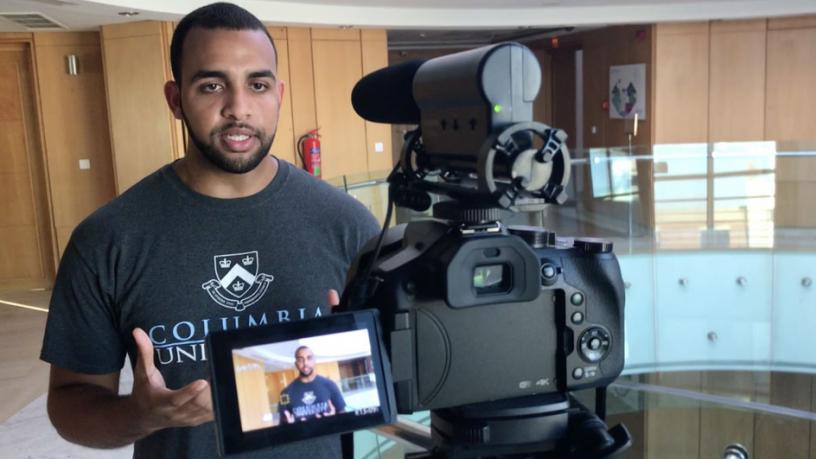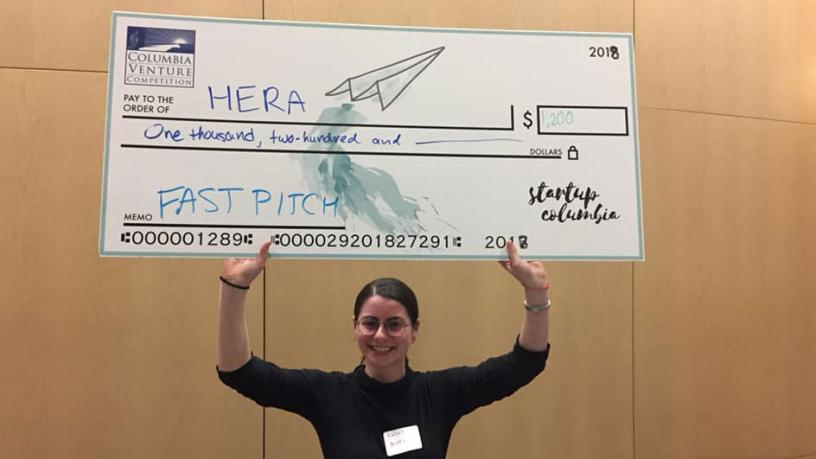Honing the Pitch
You believe you’ve engineered a novel platform capable of making medicine more accessible for patients and physicians alike. You’re facing a panel of expert judges, dozens of competitors from across the university, and sixty seconds on the clock. Where do you begin?
“We want to let doctors be doctors and patients be patients,” said Mohamed Abedelmalik ’19, by way of introducing his machine learning startup EzraMD at Columbia’s Fast Pitch Competition.

Mohamed Abedelmalik '19 participating in the Open Tunisia Startup event, one of many student events sponsored by Columbia Engineering Entrepreneurship.
Just one of over thirty student teams that faced off at Davis Hall on November 15, the group behind EzraMD took their turn in the spotlight as part of an epic evening showcasing ideas from biomedical innovations to a not-for-profit coffee company benefiting religious nonprofits worldwide. Hosted by Columbia Engineering Entrepreneurship, the popular event offers opportunities for funding and recognition, along with valuable lessons in distilling a complex concept into a snappy elevator pitch.
Overview of the 2018 Fast Pitch Competition
A project co-developed with Aunoy Poddar ’19CC, EzraMD offers intelligent transcription geared at extracting data from doctor-patient conversations. There’s much to say for the idea—transcripts are a useful reference in themselves, but also fertile ground for training natural language processing algorithms to summarize information like diagnoses, medical advice, and prescriptions. The potential applications, meanwhile, are limitless, from helping doctors compare assessments to larger insights to be gleaned from rich data sets. But for the pair the key was homing in on how EzraMD supports the relationship between physician and client, a hypothesis they expect to verify in an upcoming round of diabetes-related product testing slated for several nearby clinics and family practices.
It proved a smart move: in the end, EzraMD shared first place in the undergraduate category, picking up some real momentum. As the fall lead up to the larger Columbia Venture Competition in April, however, Fast Pitch has become more than just an annual boost for great startup projects—it’s part of an ecosystem that teaches entrepreneurship from all angles. Several of the day’s participating teams are already in the process of filing patents for their work, for instance, while winners plan to channel their prize monies into further R&D.
Such is the case with fellow first-place finisher Hera, a wearable device for early detection of mastitis, an often-painful inflammation of breast tissue that can arise during breastfeeding. In their pitch, they focused on a crucial and underserved market.
“As female engineers, we were interested in solving a problem in women’s health, and mastitis caught our attention as a condition that is quite prevalent, affecting up to 33% of lactating women, but isn’t very openly discussed or well-researched,” said Stephanie Rager ’19, who is collaborating on Hera with fellow biomedical engineers Rachel Mintz ’19, Kelly Ryu ’19, and Mia Saade ’19. “There are currently no devices on the market that detect mastitis in women, who as a result often don’t get treatment until symptoms progress and they are in excruciating pain.”
Hera and EzraMD each received $1200. Another undergraduate start-up, Dux, from Bruce Horimbere ’21CC, Yvon Manzi ’21CC, and William Oseghare ’21, earned the audience choice award and $100 for their proposed electronic college counselor for students in Nigeria.
In the graduate track, Local Impact Inc. took first place and $2000 for Local, an education technology platform designed to incentivize high schoolers’ civic involvement. The company consists of Beverly Leon ’14CC ‘20BUSS, Jeremy Mingo ’14CC, Stephanie Odiase ’14CC, and Jihad Dennis. In second place, receiving $500, was SmartARSect, from Agustin Acosta-Ghioldi ’18, Drew Afromsky ’18 MS’19, Jacob Nye ’18 MS’19, and Bina Bansinath, an algorithm-driven augmented reality tool for helping surgeons remove cancerous polyps from the colon.
Such creative thinking is what ultimately carried the day. No matter how pithy the presentation, participants noted, a great pitch requires equally great work under the hood.
“I really believe our functionality can do a lot of good,” Abedelmalik said. “We think we can provide more value to patients.”

Rachel Mintz '19 is co-developer of Hera, a biomedical startup that shared first place at Columbia's Fast Pitch Competition.
